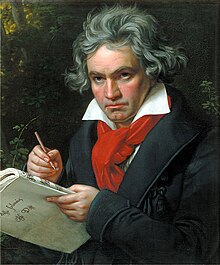https://en.wikipedia.org/wiki/Ludwig_van_Beethoven
| Ludwig van Beethoven | |
|---|---|

Portrait by Joseph Karl Stieler, 1820
| |
| Born | Bonn |
| Baptised | 17 December 1770[1] |
| Died | 26 March 1827 (aged 56) Vienna |
| Works | List of compositions |
| Signature | |
Ludwig van Beethoven (/ˈlʊdvɪɡ  listen); German: [ˈluːtvɪç fan ˈbeːthoːfn̩] (
listen); German: [ˈluːtvɪç fan ˈbeːthoːfn̩] ( listen); baptised 17 December 1770[1] – 26 March 1827) was a German composer and pianist. A crucial figure in the transition between the Classical and Romantic eras in Classical music, he remains one of the most recognised and influential of all composers. His best-known compositions include 9 symphonies, 5 piano concertos, 1 violin concerto, 32 piano sonatas, 16 string quartets, a Mass the Missa solemnis, and an opera, Fidelio.
listen); baptised 17 December 1770[1] – 26 March 1827) was a German composer and pianist. A crucial figure in the transition between the Classical and Romantic eras in Classical music, he remains one of the most recognised and influential of all composers. His best-known compositions include 9 symphonies, 5 piano concertos, 1 violin concerto, 32 piano sonatas, 16 string quartets, a Mass the Missa solemnis, and an opera, Fidelio.
Ludwig van Beethoven is universally viewed as one of the most influential figures in the history of classical music. Since his lifetime, when he was "universally accepted as the greatest living composer", Beethoven's music has remained among the most performed, discussed and reviewed.[1] Scholarly journals are devoted to analysis of his life and work. He has been the subject of numerous biographies and monographs, and his music was the driving force behind the development of Schenkerian analysis. He is widely considered as among the most important composers, and along with Bach and Mozart, his music is the most frequently recorded.[2]
Beethoven's stylistic innovations bridge the Classical and Romantic periods. The works of his early period brought the Classical form to its highest expressive level, expanding in formal, structural, and harmonic terms the musical idiom developed by predecessors such as Mozart and Haydn. The works of his middle period were more forward-looking, contributing to the musical language and thinking of the Romantic era, inspiring composers such as Franz Schubert, Felix Mendelssohn, Robert Schumann, Franz Liszt, Richard Wagner, and Johannes Brahms. His late period works were characterized by formal, harmonic, and structural experimentation at the highest level, often pointing toward contrapuntaltendencies and microscopic textures, as well as an increasingly introverted compositional outlook. Though rightly credited as a major harbinger of the Romantic era in music that followed, Beethoven never fully abandoned the fundamental formal paradigms and generally objective artistic philosophy characterizing musical Classicism to the same extent that later composers such as Berlioz or even Schubert did.
https://en.wikipedia.org/wiki/Beethoven%27s_musical_style



No comments:
Post a Comment